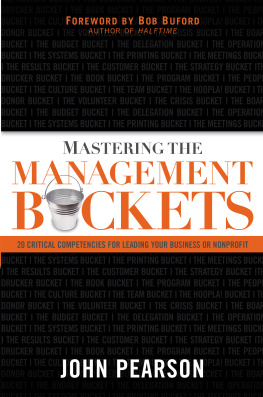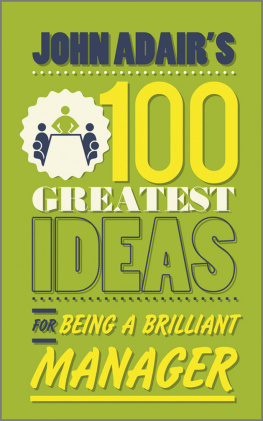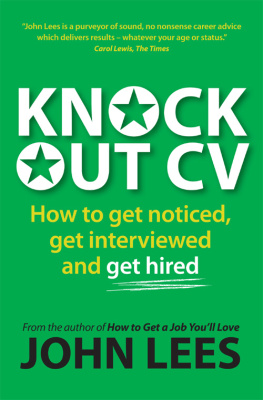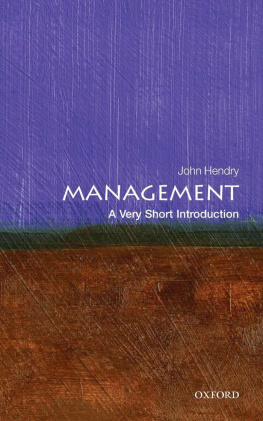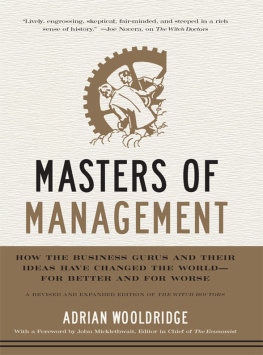This impressive book combines an admirably broad focus on the phenomenon of hierarchy ranging from its understanding by ancient philosophers to the latest analysis by contemporary business scholars with great theoretical depth and extensive empirical substantiation of hierarchys many forms and consequences. For Child, the consequences go well beyond those of co-ordination and control of business operations to troubling social and political outcomes for contemporary society, and he makes his case by drawing on the literature from several disciplines. Beyond its intrinsic interest, the books exemplary clarity and accessible style will ensure it a readership well beyond the field of business management.
Christel Lane, Professor Emeritus of Economic Sociology, University of Cambridge, UK
John Child elegantly captures the yin and yang of social hierarchy. His book dives deep into a perplexing paradox that permeates all organizations and cultures: hierarchies functionally and efficiently organize our interactions, yet they create division and inequality. John not only exposes this paradox but, more importantly, he identifies ways to harness the good in social hierarchy while minimizing its dark downside. It is a very timely read!
Adam Galinsky, Professor of Business at Columbia University, USA and co-author of the best-selling book, Friend & Foe
In his latest monograph, John Child describes succinctly how hierarchy persistently has been the backbone of our societies and organisations and, crucially, how this can and should be changed.
Thomas Diefenbach, Professor in Management,Charles Darwin University, Australia
Modern organizations are supposed to be lean and decentralized, innovative and networked, open and project-based. Nevertheless, hierarchy remains the backbone of organizational coordination. This is what Professor John Child makes crystal clear in this book on the role of hierarchy in organizations, thereby linking the development of modern forms of organizing to developments in society (e.g. in terms of inequality). Written in a very accessible and concise style, John Child draws on a wide variety of disciplines, including not only economics, psychology, and sociology, but also anthropology and philosophy. A must read!
Jrg Sydow, Professor of Management,Freie Universitt Berlin, Germany
HIERARCHY
Written by a world-renowned authority, Hierarchy takes readers on a journey which traverses how hierarchy has evolved, is understood in various disciplines, and is applied in practice.
Referring a wide range of sources, the book provides an inspirational introduction to understanding what is perhaps the key idea in business and management. As a fundamental organizational principle, hierarchy is everywhere. Perhaps because of its ubiquity, the significance of hierarchy has become under-analyzed in view of the growing strains on society imposed by organizational inequality. This book analyzes the advantages and disadvantages that hierarchy brings as a form of organization, providing an accessible overview of this fundamental idea within both business and society.
This concise book provides a useful overview of existing research, for students and scholars of business and the social sciences.
John Child is Professor of Commerce at the University of Birmingham, UK and a Fellow of the British Academy. He is the author of 25 books and numerous scholarly articles.
Key Ideas in Business and Management
EDITED BY STEWART CLEGG
Understanding how business affects and is affected by the wider world is a challenge made more difficult by the disaggregation between various disciplines, from operations research to corporate governance. This series features concise books that break out from disciplinary silos to facilitate understanding by analyzing key ideas that shape and influence business, organizations, and management.
Each book focuses on a key idea, locating it in relation to other fields, facilitating deeper understanding of its applications and meanings, and providing critical discussion of the contribution of relevant authors and thinkers. The books provide students and scholars with thought-provoking insights that aid the study and research of business and management.
Hierarchy
A Key Idea for Business and Society
John Child
For more information about this series, please visit: www.routledge.com/Key-Ideas-in-Business-and-Management/book-series/KEYBUS
HIERARCHY
A Key Idea for Business and Society
John Child
First published 2019
by Routledge
2 Park Square, Milton Park, Abingdon, Oxon OX14 4RN
and by Routledge
52 Vanderbilt Avenue, New York, NY 10017
Routledge is an imprint of the Taylor & Francis Group, an informa business
2019 John Child
The right of John Child to be identified as author of this work has been asserted by him in accordance with sections 77 and 78 of the Copyright, Designs and Patents Act 1988.
All rights reserved. No part of this book may be reprinted or reproduced or utilized in any form or by any electronic, mechanical, or other means, now known or hereafter invented, including photocopying and recording, or in any information storage or retrieval system, without permission in writing from the publishers.
Trademark notice : Product or corporate names may be trademarks or registered trademarks, and are used only for identification and explanation without intent to infringe.
British Library Cataloguing-in-Publication Data
A catalogue record for this book is available from the British Library
Library of Congress Cataloging-in-Publication Data
Names: Child, John, 1940- author.
Title: Hierarchy : a key idea for business and society / John Child.
Description: First Edition. | New York : Routledge, 2019. | Series: Key ideas in business and management | Includes bibliographical references and index.
Identifiers: LCCN 2018061199| ISBN 9781138044388 (hardback) | ISBN 9781138044418 (pbk.) | ISBN 9781315172378 (ebook)Subjects: LCSH: Hierarchies. | Organization. | Management.
Classification: LCC HM716 .C45 2019 | DDC 302.3/5dc23
LC record available at https://lccn.loc.gov/2018061199
ISBN: 978-1-138-04438-8 (hbk)
ISBN: 978-1-138-04441-8 (pbk)
ISBN: 978-1-315-17237-8 (ebk)
CONTENTS
The origins of this book go back to my inaugural lecture delivered as Professor of Organizational Behaviour at Aston University in 1974, a development of which appeared in the journal Human Relations in 1976. The theme of the lecture was how bureaucracy and hierarchical centralization had increased the remoteness of employees and the general public from decision-making on policy issues. I argued that this lack of participation threatened social cohesion and the legitimacy of social institutions. Although one might maintain that 1974 was a year of exceptional political and social turmoil in both the UK and USA, the underlying problem has not been resolved today and has indeed become even more serious. So, over forty years later, I decided to return to this issue, focusing now on the role played by hierarchy. By examining hierarchy both as an idea and a practice, I hope that this book provides a foundation for understanding the challenge and what we might do about it.







